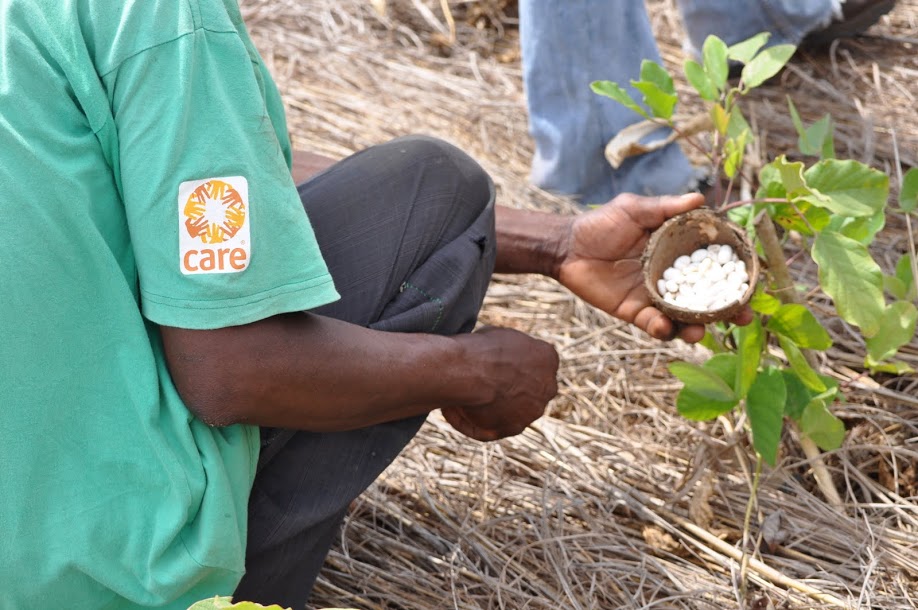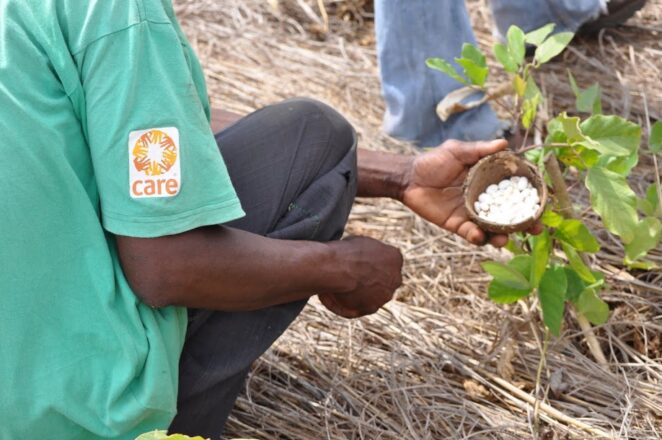Farmer field schools in Mozambique


Harvesting beans at the conservation agriculture demonstration plot, Vilankulos, Mozambique. © Faith Amon / CARE
Eighty percent of Mozambique’s smallholders depend on rain-fed, non-mechanised and subsistence-based farming practices. Much-needed agricultural extension services and inputs such as fertilisers, pesticides and improved plant varieties are difficult to access. Increasingly irregular rainfalls, cyclones and higher temperatures are placing further constraints on farmers’ livelihoods, agricultural productivity and food security. In the Nampula region, poor soils, limited access to water, infrastructure and transport, reducing fish stocks and shortened fishing and farming seasons leave these communities in a highly vulnerable situation.
Capacity development for local civil society and government institutions
In the Angoche District of Nampula, CARE Mozambique and the National Association of Rural Extension (AENA) are using farmer field schools (FFS) to strengthen links between different agricultural service providers and to build farmers’ capacities in sustainable agriculture techniques. Farmers meet weekly to practise conservation agriculture (CA) as a live demonstration throughout the year, focusing on protecting and building soil fertility and introducing a wider diversity of crop varieties. CA uses mulch, green manures (soil-enhancing crops, herbs and trees) crop mixtures and rotations of groundnut, pigeon peas and cowpea between the staple crop, cassava. These cover the soil, increase water retention from any rains that occur, recycle nutrients and improve soil structure.
Promotion of climate-resilient livelihoods strategies
The FFS model provides a platform for learning that directly relates to the practices farmers depend on for their livelihoods. Learning is practical in nature and promotes the sharing of observations and experience among farmers, which has led to the replication of good practice techniques, even on the farms of non-participating farmers. Through regular discussions, farmers are able to analyse their own techniques and local knowledge, assess the value of new practices introduced by extension workers, and conduct their own experiments in farming innovation. FFS strengthens farmer organisations and provides social benefits, for example organised access to inputs and markets, savings and credit. It also increases solidarity among members while strengthening the voices of many women farmers in the community.
Disaster risk reduction strategies
Farmers in Angoche have recently been discussing how they might better access weather information via text messages from local disaster risk reduction agents, or by radio. Early warnings of cyclones and droughts, as well as seasonal forecasts that provide information about rainfall probability and estimate when rainfall periods are likely to occur, can allow farmers to make better-informed decisions about which crop and variety combinations to invest in on their farms. The FFS demonstration plots can also provide a useful testing ground for trying out different combinations of crops and keeping a record of their success in relation to actual rainfall. This can then inform future decisions on crop selection depending on the likely weather scenario.
Advocacy and social mobilisation to address the underlying causes of vulnerability
The FFS approach contributes directly to building the adaptive capacity of farming communities. It does this by increasing their knowledge, improving access to information and services, assisting with innovation in farming technologies and techniques, strengthening collective organisation and, in particular, enhancing their ability to make more informed and anticipatory livelihood decisions. The project plans to build on the current FFS system to more deliberately include climate change awareness and adaptation planning, drawing on the CBA Framework and other FFS climate change approaches. Community members are already reporting that their FFS attendance helps them to understand and address climate change impacts and that they are keen to improve their adaptation measures for better risk management and more resilient livelihoods.
Farmer field schools in a nutshell
The farmer field school (FFS) model exists in many countries around the world. In contrast to the usual model of knowledge transfer – from an expert agricultural extension worker to a farmer – the FFS approach uses participatory teaching methods and is specially adapted to adult learning needs. Farmers regularly visit the FFS, where they can experiment with different farming techniques and crop varieties. This allows them to observe and analyse how and why different outcomes are generated, and so be able to make informed decisions about farming techniques.
(1) Comment
We are seeking NGOs that are using legumes to help impoverished soils get re-fertilsed in SSA countries as proposed by Roland Bunch; https://foodfirst.org/wp-content/uploads/2016/02/AfricaReportFinal2.pdf
This is to provide help the poorest subsistence farmers in Africa
Graham Knight
BioDesign